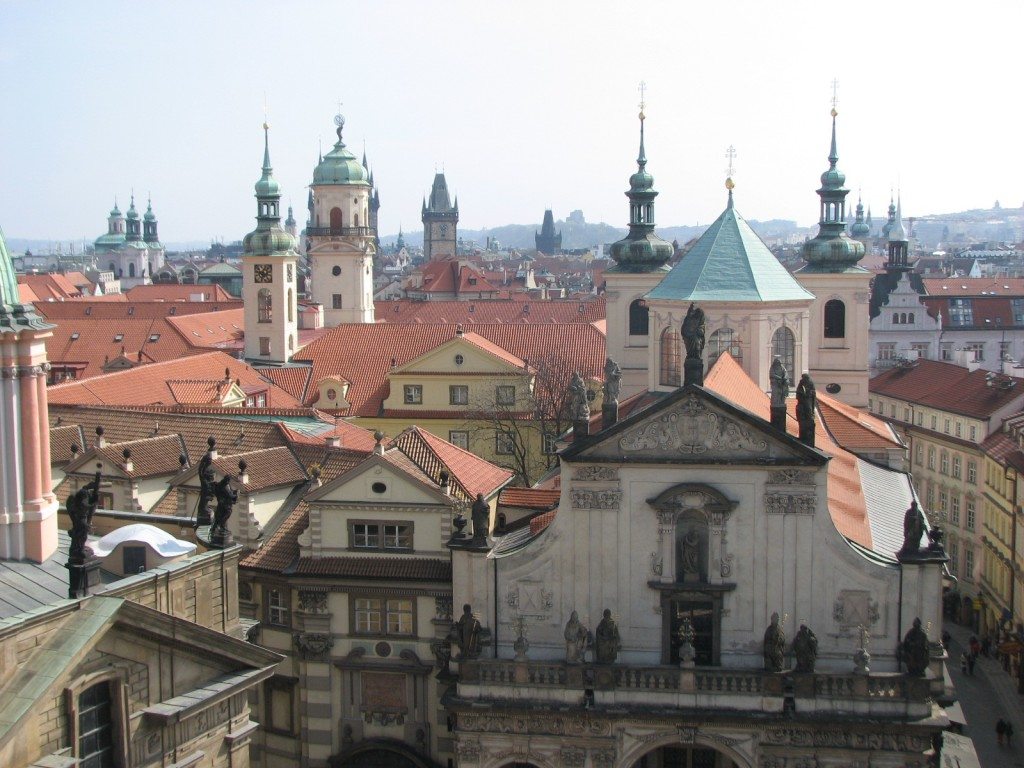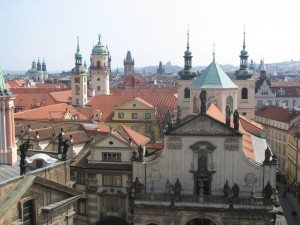 Then (1991): The dusty train station was mostly empty except for a few tourists. I was approached by enterprising Czechoslovakians holding out pictures of rooms to rent, most in private homes. I rented a room near the old square with a view of the river. It was a bedroom in the apartment of a middle-aged woman. She was kind, charged a reasonable price, and spoke little English.
Then (1991): The dusty train station was mostly empty except for a few tourists. I was approached by enterprising Czechoslovakians holding out pictures of rooms to rent, most in private homes. I rented a room near the old square with a view of the river. It was a bedroom in the apartment of a middle-aged woman. She was kind, charged a reasonable price, and spoke little English.
Now (2012): The train station in the Czech Republic is loud and bustling. It boasts a Burger King, a giant bookstore, DM, and fleets of taxi drivers waiting to charge us 400CZK for a trip into the city center. The tourist information booth sold us a map of Prague for 2 Euros and called a fixed-price cab for 250CZK. As we waited, we realized that the tourist information booth was actually for-profit, not run by the government to facilitate tourism but simply a private venture aimed at extracting tourist dollars from unsuspecting tourists. The taxi driver, being honest, charged us only 190CZK.
Then: Communism was an everyday vocabulary word. Every spy in every movie I watched growing up was from the USSR. The falling of the Berlin wall was something I watched on TV with my parents.
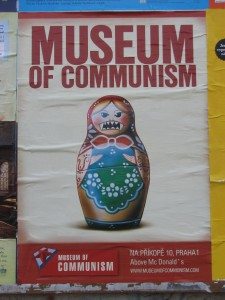 Now: There are communist tours (including a visit to a nuclear bunker), the Communist Museum is housed “above MacDonalds”, and my kids need a political lecture to even begin to understand the possibilities of political ideas and change.
Now: There are communist tours (including a visit to a nuclear bunker), the Communist Museum is housed “above MacDonalds”, and my kids need a political lecture to even begin to understand the possibilities of political ideas and change.
Then: There were no souvenirs to be found, no stalls selling anything (except, strangely enough, long strings of crystal beads), and, though the main boulevard was practically lined with construction vehicles building new hotels and casinos, there was little operational tourist infrastructure.
Now: There are souvenir stores everywhere. There is a museum of medieval torture, an assassination tour of Prague, and a Prague beer tour if you need more ways to spend money as a tourist. The entire Old Town Square was taken over with an Easter market. There were, perhaps, 100 stands selling painted eggs, sausages, beer, crepes, and trinkets.
Then: One could get by with a few words of French. Russian would have been a useful language to know. There was nearly no English. The restaurants had menus in Czech at one price point and menus hand-written in English at 3 times the Czech price point.
Now: We stopped at the Easter Market for some tasty-looking potato dishes being warmed in giant iron skillets. The price looked reasonable, 39CZK per 100g. A friendly, English-speaking guy in his mid-twenties loaded up the dishes and charged us the equivalent of nearly $25 USD for the weighty, over-filled plates! Seriously? If my math had been a hair faster, my stomach somewhat less empty, and my nerves a bit stronger, I would have marched away outraged.
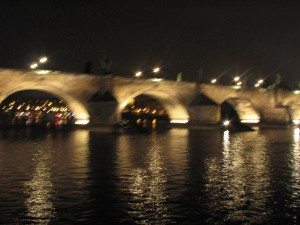 Then: The city was filled with a beautiful light. The river was slow and peaceful and mesmerizing. The astronomical clock was breathtaking. My kind, landlord sent me with an empty jug and some simple instructions to look for a clock. I found the landmark clock and filled the empty jug with rich, creamy beer to bring home for dinner. This was the experience I most remembered from 1991 – wonderful, local, delicious.
Then: The city was filled with a beautiful light. The river was slow and peaceful and mesmerizing. The astronomical clock was breathtaking. My kind, landlord sent me with an empty jug and some simple instructions to look for a clock. I found the landmark clock and filled the empty jug with rich, creamy beer to bring home for dinner. This was the experience I most remembered from 1991 – wonderful, local, delicious.
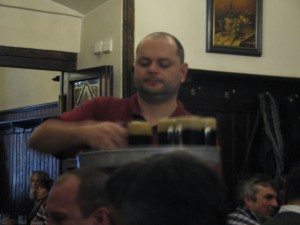 <b> </b>
<b> </b>
.
Now: The city was filled with a beautiful light. The river was slow and peaceful and mesmerizing. The astronomical clock was breathtaking. I found a tasteful brochure advertising a brewery under a clock and I dragged my family all the way across town to visit U Fleku. It did not disappoint. The smoky rooms were filled with tables of tourists and locals mixed together. Rich, creamy beer arrived nearly instantly and the accordion player played until the table next to us could sing no more.

